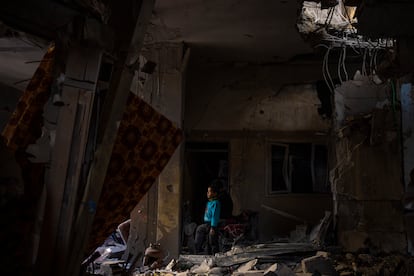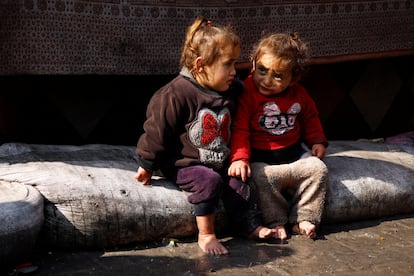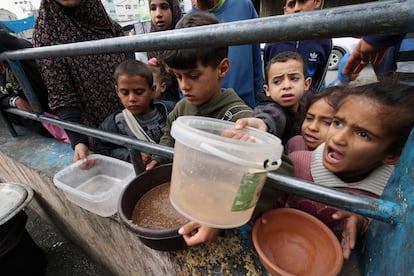War separates 17,000 children in Gaza from their families
Many minors have become lost during forced displacements and, amid the chaos in the Palestinian enclave, no one has been able to locate their parents. Others are orphans, whether they know it or not


Some show up alone and injured at the hospital. Others are helped by strangers when they realize a child is wandering next to them, following the crowd. Four and a half months of war in Gaza have separated some 17,000 minors from their families, according to data from UNICEF, the United Nations children’s agency. Some of them are orphans, whether they know it or not; others are lost. This figure is only an estimate because, amid the chaos in the Gaza Strip, it is impossible to determine the exact number. They represent 1% of the 1.7 million displaced people, who are largely concentrated in and around Rafah — an area Israeli leaders say they must invade before the war in Gaza can come to an end.
“Like all the data concerning Gaza today, it is proportionally much higher than that of any other conflict in the modern era,” Hamish Young, UNICEF senior emergency coordinator, tells EL PAÍS in a video call from Rafah.
“Many don’t know if their parents are alive or not,” explains Ruth Conde, a Spanish pediatric nurse who returned last January from southern Gaza after a month as a volunteer in various health centers with the NGO Doctors Without Borders. In some strikes on homes in densely populated areas, up to 20 members of the same family clan have died. In Palestine — and in the Arab world in general — the family network is very big, and it is common to add floors to the same property so that the male children can have a separate space after getting married.

Some of these unaccompanied children are injured and alone when they arrive at the hospital, says Conde. “They themselves are the ones who tell you that they are alone.” There is an acronym to define them, WCNSF: wounded child, no surviving family. Other children are brought by strangers who are already having a hard time feeding their own children. “They are dropped off from people who say: ‘We found them when we were going from Khan Yunis to Rafah, and we took them in,’” says Conde. “They have such levels of anxiety that we have seen self-harming behavior and even suicidal ideation.” Even before the war, UNICEF estimated that half a million children needed mental health support. Now, after 136 days of war, with nearly 30,000 Palestinians dead in the midst of destruction not since World War II and a humanitarian crisis, there are one million traumatized children.
“When you are fleeing for your life,” explains Young, “it is very easy for parents to lose a child, especially if they are young or caring for several children at the same time. Sometimes they have to simultaneously carry a baby in their arms and drag several children by the hand. It is very, very easy for them to become separated in those circumstances.”
Added to this is the scale of the forced displacement in Gaza, Young believes is “most likely” to be “the main reason” why so many children are not accompanied by their families today. Between October and November, around a million people fled from the north to the south under orders of the Israeli army. At the beginning of December, after a week-long ceasefire, Israel began to target its strikes in the south and invaded Khan Younis, the main city in the area, which has triggered other smaller-scale exoduses. Sometimes it’s the same people, looking for a safe place that doesn’t exist.
Vulnerable children
The most vulnerable cases are the children for whom no one can find a family connection, explains Young, who gives the example of a four-year-old girl he has visited on several occasions. “She was wandering unaccompanied in the middle of a combat zone. […] We took her to the hospital. She had some injuries and was extremely traumatized. For a while, she couldn’t even speak. Now she is well cared for and protected, both physically and in psychosocial support, but she only says her first name, not her surname. She cannot say what happened to her, where she comes from, or who her parents are,” says Young.

When reporting on the estimate of minors separated from the family, Jonathan Crickx, the head of rights advocacy and communications for UNICEF in Palestine, mentioned two other cases. “In a center where unaccompanied children are hosted and cared for, I also saw two very young children aged six and four,” he said at the press conference in Geneva on February 4. “They are cousins and their entire respective families were killed in the first half of December. The four-year-old girl — in particular — is still very much in shock. I met these children in Rafah. We fear that the situation of children who have lost their parents is much worse in the north and the center of the Gaza Strip.”
Humanitarian aid is not reaching the north, where more cases of severe malnutrition are being recorded. In the south is where international organizations and NGOs are focusing their efforts, so there is a registration process and a protocol to address unaccompanied minors.
There are also shelters, such as those run by the U.N. agency for Palestinian refugees (UNRWA), where the children are cared for by community and, sometimes, social or health workers. In the least organized facilities, everything works more organically and there are no records, says Young. People ask around to try to connect them with members of their family. In Gaza, social ties are close and neighbors usually know the patronymic surname of each person or the main families in the area. But everything is more complicated in the crowded chaos of Rafah, where hundreds of thousands of people are living in official shelters; many others in tents, and an undetermined number are hosted by relatives out of solidarity or paying rent in apartments or rooms.
Sign up for our weekly newsletter to get more English-language news coverage from EL PAÍS USA Edition
Tu suscripción se está usando en otro dispositivo
¿Quieres añadir otro usuario a tu suscripción?
Si continúas leyendo en este dispositivo, no se podrá leer en el otro.
FlechaTu suscripción se está usando en otro dispositivo y solo puedes acceder a EL PAÍS desde un dispositivo a la vez.
Si quieres compartir tu cuenta, cambia tu suscripción a la modalidad Premium, así podrás añadir otro usuario. Cada uno accederá con su propia cuenta de email, lo que os permitirá personalizar vuestra experiencia en EL PAÍS.
¿Tienes una suscripción de empresa? Accede aquí para contratar más cuentas.
En el caso de no saber quién está usando tu cuenta, te recomendamos cambiar tu contraseña aquí.
Si decides continuar compartiendo tu cuenta, este mensaje se mostrará en tu dispositivo y en el de la otra persona que está usando tu cuenta de forma indefinida, afectando a tu experiencia de lectura. Puedes consultar aquí los términos y condiciones de la suscripción digital.








































